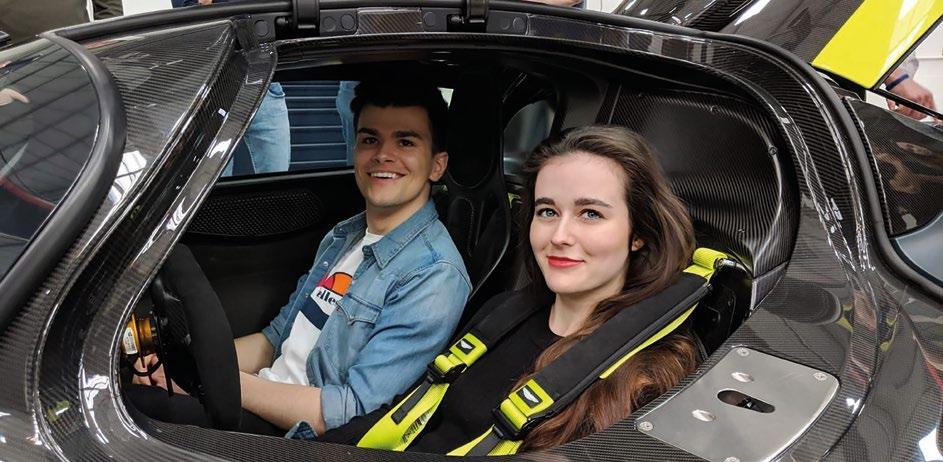
5 minute read
The Old Oakhamian Magazine Issue 117
FINDING THE RIGHT FORMULA
We last spoke to Ellie Slater (’13) when she was an undergraduate doing a placement year with the Mercedes AMG Petronas F1 Team as a Tyre Engineer. Five years after that initial interview, Rachel Fairweather caught up with Ellie to find out about her life since finishing university.
Advertisement
Ellie graduated from the University of Leeds in 2018 after finishing her Honours Class 1 in Meng Automotive Engineering (Industrial) and got a job working with Red Bull Advanced Technologies as a Simulation and Modelling Engineer. Part of a 15-strong team, Ellie’s primary focus was on developing ‘Valkyrie’, a new road car using F1 technology produced in collaboration with Aston Martin. “This provided broad, generic work focusing on different aspects from concept simulation and analysing results to hydraulics and control systems.”
After being made redundant due to the Covid-19 pandemic, Ellie spent six months working with her school friend Jess Armitage (’13) milking cows and “absolutely loved it”; so much so that Ellie now helps out most weekends and has her own favourite cows amongst the herd.
November 2020 saw Ellie return to the world of F1 and she now works for Alpine F1 (formerly known as Renault Formula 1) as a Software Engineer, primarily using the HIL (Hardware-in-the-loop simulation) rig to ensure their cars are ready to race.
Based in Oxfordshire and back working within a Formula 1 team, Ellie is once again enjoying the fastpaced world of race car engineering. “You sometimes have to work long hours to meet deadlines, but I love working within that sort of time pressure. Oakham with its long school days prepared me well for this side of the job.”
Naming Head of Physics, Dr John Chilton, as one of the main reasons why she chose to study Engineering at university – “Dr Chilton was always very supportive” – Ellie credits another more unusual subject that she studied at Oakham School as having helped her enormously with her career thus far. “Fine Art was the best thing I did. I gained my subject knowledge [in order to study Engineering] from Maths and Physics, but there are so many transferable skills I developed from studying Art that helped me a lot at university and now in my job: communication, presentation, and research skills, paying close attention to small details.”
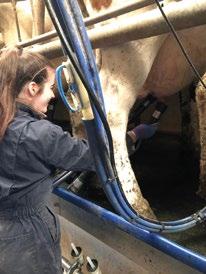
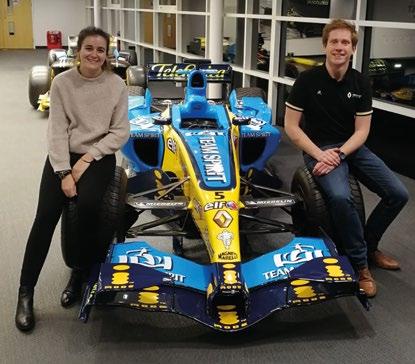
Ellie loved Art so much that her initial career plans tended in this direction – in fact she still takes on art commissions in her free time. However, a variety of work experience placements that Ellie did whilst at School helped to guide her in the direction of Engineering. After time spent at an interior design company and then an architect’s firm, a chance suggestion from Ellie’s father that she try a motorsport placement saw her spend a week in the autumn of Form 7 with the European F3 Team WestTec in Corby. “I loved it so much that I didn’t want to leave. I spent a test day in Silverstone and fell in love. It was a happy accident that worked.”
Reflecting on her ambition whilst on her undergraduate placement to be ‘working trackside, preferably as a tyre or race engineer’, Ellie says that although this is something she might consider in the future, it’s no longer the summit of her ambitions: “I would still love to gain the experience of race engineering and working trackside on the tyres, but I’m not sure this is something I would want to do in the long term. There are 23 F1 races throughout the year, which means 23 weeks of the year you are away from home and whilst travelling all over the world may seem glamorous, it’s often just the airport, hotel and race track that you see.” Ellie’s future may see her combining the experience she gained working with Jess’s dairy herd with her engineering expertise: “My perfect life would be engineering in the winter and milking the cows in the summer.”
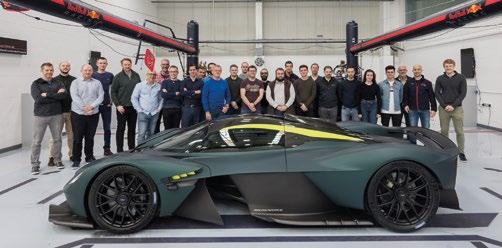
ELLIE’S ADVICE ON ENGINEERING AS A CAREER
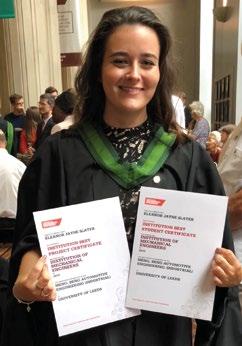
Get as much work experience as possible.
Any work experience is good experience. It doesn’t matter what it is – through it you will find out what you want to do. For race car engineering, for example, you could consider all the formulas or volunteer as a race marshal. The transferable skills that work experience teaches you and the skills you gain from being in a workplace atmosphere are invaluable. It’s just as important to discover what you don’t enjoy doing, as well as what you like.
Develop communication, presentation and research skills. These generic transferable skills are just as important as having the right subject knowledge.
Learn to code. It’s really important to have a basic understanding of coding and it will come up at university. There are lots of different programs you can teach yourself: MATLAB, Python and C# are a great place to start.
Consider an apprenticeship. For those interested in a hands-on career as a technician or mechanic, a lot of F1 teams offer very good apprenticeships. This could be a route for those who don’t necessarily think that university is for them, but are still interested in racing too.




